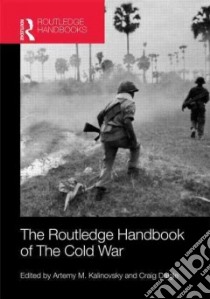The Routledge Handbook of the Cold War - 9780415677011
Un libro in lingua di Kalinovsky Artemy M. (EDT) Daigle Craig (EDT) edito da Routledge, 2014
- € 247.80
- Il prezzo è variabile in funzione del cambio della valuta d’origine
This new Handbook offers a wide-ranging overview of current scholarship on the Cold War, with essays from many leading and emerging scholars. The last twenty years have seen a number of conceptual and methodological innovations that have transformed what it means to study the Cold War, and this work aims to bring together these developments in one volume.
For nearly fifty years, the Cold War was the dominant paradigm in international relations. What began as primarily as a confrontation between the Soviet Union and the United States over the shape of post-war Europe ultimately affected developments as varied as decolonization, European integration, domestic politics, science and technology, and mass culture. No part of the world was unaffected – from North Korea to Argentina, from Alaska to Cape Town. Over the last twenty years, the field of Cold War history has consistently been one of the most vibrant in the field of international studies. The opening of archives in eastern Europe and the former Soviet Union prompted historians to re-evaluate almost every aspect of the Cold War; our understanding of the world behind the curtain was also enhanced by the willingness of former participants to speak about their experiences or to put them down in memoirs. Equally as important, scholars from both sides of the Iron Curtain were now working in the field, drawing on each other’s archives, expertise, and perspectives.
The Handbook is organized in five parts:
- Part I provides a historical overview of the origins of the Cold War, drawing on recent research.
- Part II, looks at efforts to regulate the Cold War conflict, first after Stalin’s death and then, more successfully, in the late 1960s and 1970s; it will also consider why détente collapsed.
- Part III looks at the Cold War in the Third World, considering both why newly decolonized states looked to Moscow and Washington for support and why and how the Cold War adversaries came to fight their contest there.
- Part IV examines culture and the Cold War.
- Part V examines the role of science and technology on the Cold War (and the impact of the Cold War on science and technology in the US, USSR, and Europe).
- Part VI focuses on the collapse of the Soviet Union and the end of the Cold War.
This new Handbook will be of great interest to all students of the Cold War, International History, Foreign Policy, and International Relations and International Security Studies in general.
Informazioni bibliografiche
- Titolo del Libro in lingua: The Routledge Handbook of the Cold War
- Lingua: English
- Autori : Kalinovsky Artemy M. (EDT) Daigle Craig (EDT)
- Editore: Routledge
- Collana: Routledge (Hardcover)
- Data di Pubblicazione: 16 Settembre '14
- Genere: POLITICAL SCIENCE
- Pagine: 439
- EAN-13: 9780415677011


